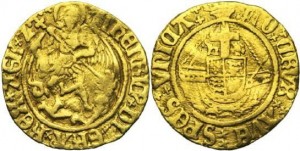For a play about justice and mercy, Shakespeare’s Measure For Measure focuses a lot on currency and forgery. While it’s not exactly The Merchant of Venice, the story involves people and their comparisons to money. And Angelo, our selfish and typical villain, is smack dab in the center of it.
In the play, the Duke of Vienna takes a temporary break off work and appoints Angelo to act as leader during his absence. In response to the nomination, Angelo compares himself to a metal coin that requires testing to see if it has any true value:
“Let there be some more test made of my metal,/ Before so noble and great a figure/ Be stamp’d upon it” (I.I.47-50).
Hiding his true intentions, Angelo asks the Duke to give him a job applicable to his skills, believing himself unable to rule the city alone. The punning shows up when Angelo wants to prove his “metal” to the Duke. Angelo plays on the words “metal” and “mettle,” implying his own strength of character to be as tough as bronze or steel. Alluding to the coin-making process, Angelo embodies himself as a piece of metallic currency worthy of being utilized by the Duke. In his greedy bid for power, Angelo wants the Duke’s metaphorical “stamp” of approval. As we all know however, Angelo’s “metal” may initially seem shiny and highly-prized on the surface, but behind the veneer of leadership lies a counterfeit, corrupted despot full of devious goals.
Angelo’s name refers to an “angel’ or “nobel-angel,” a type of golden coin that was introduced in Britain by Edward IV in 1465. On one side of the coin, the image depicted the archangel Michael slaying a dragon.1 The reverse side depicts an English galley with rays of sun at its masthead. A Latin inscription around the ship states “By Thy cross save us, Christ Redeemer.” The coin’s comparison to Angelo is sort of ironic; he does anything but save the people under his care. Instead, Angelo uses the people under his control to his own benefit, even tarnishing the church by blackmailing a nun to sleep with him (Think Isabella).
In the last scene of the play, Escalus calls out the corrupt and crafty deputy on his disgusting, hypocritical behavior when the Duke questions his leadership:
“I am sorry, one so learned and so wise/ As you, Lord Angelo, have still appear’d,/ Should slip so grossly, both in the heat of blood. And lack of tempered judgement afterward. (V.I.468-471)
Once again, we see coin-making language showing up in this scene. Mocking Angelo for his mistakes, Escalus points out that Angelo seems like a golden boy on the surface layer, but remains corrupt on the inside. Escalus also plays on the double meaning of “slip.” Superficially, he’s laughing at Angelo for slipping up in his flagrantly poor behavior, who’s now caught redhanded in a scandal with a nun and his ex-wife. At the same time Escalus is referring to a “slip,” a counterfeit coin made from lower valued metal in Shakespeare’s time. Back then, currency was tied to the precious metal inside it, instead the fiat money system society uses today. Forgers tried to pass off fake coins that had less material value than their real counterparts. In order to prevent counterfeiting during the Middle Ages, people commonly nailed a hole through through the slip.
Angelo’s initial punishment, aka decapitation, alludes to this medieval practice. By removing a piece of the object, whether its a human head (grisly I know) or a coin’s center, an authority like the Duke can effectively dish out retribution. The duality of the word “slip” then mirrors both Angelo’s mistakes and spurious behavior as the temporary leader of Vienna. Because Angelo lacks the “tempered” step needed to fortify a resilient and valuable personality, the Duke judges him to be a phony and a failure of a leader. Angelo therefore loses his position as the Duke’s golden boy and righthand in governing the lovestruck and promiscuous residents of Vienna.
Sources:
1. “Angel (Coin).” Wikipedia. Wikimedia Foundation, Web. 11 Aug. 2015.
2. Shakespeare, William. “Measure For Measure” The Complete Pelican Shakespeare. Eds. Stephen Orgel, and A R. Braunmuller. New York, NY: Penguin Books, 2002. Print.
3. Goldsborough, Reid. “Counterfeit Coin Detection.” Counterfeit Coins, 2014. Web. 11 Aug. 2015.


